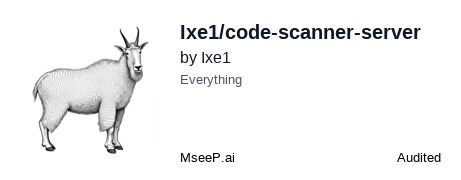About
A TypeScript/Node.js MCP server and CLI tool that scans codebases for classes, functions, variables, etc., respects .gitignore, and outputs Markdown, XML, or JSON for AI consumption.
Capabilities

Overview
The Code Scanner Server is a Model Context Protocol (MCP) compliant service that turns static codebases into richly structured, LLM‑friendly data. By parsing source files with Tree‑sitter, it extracts a wide variety of language constructs—functions, classes, interfaces, variables, and more—across JavaScript, TypeScript, C#, PHP, CSS, and Python. The extracted information is returned in clean formats such as Markdown, XML, or JSON, making it trivial for an AI assistant to ingest the code’s architecture and surface precise details like line numbers, access modifiers, or naming patterns.
For developers building AI‑enhanced tooling, this server solves a common pain point: the need for programmatic insight into code structure without writing custom parsers. Instead of relying on brittle regex or shell scripts, the scanner provides a single, reliable endpoint that respects rules and supports granular filtering. Developers can ask an assistant to “list all public methods in ” or “find private classes with names matching ,” and the server will return a concise, machine‑readable list that can be rendered in documentation or used to drive further analysis.
Key capabilities include:
- Multi‑language support via Tree‑sitter grammars, allowing consistent extraction across diverse codebases.
- Fine‑grained filtering by type, modifier, name regex, and file path patterns, enabling targeted queries.
- Multiple output formats (Markdown for human‑readable docs, XML/JSON for downstream pipelines).
- Configurable verbosity levels (, , ) to balance detail against payload size.
- Dual operation modes: a standalone CLI for quick ad‑hoc scans and an MCP server ( tool) that seamlessly integrates with AI assistants.
In real‑world scenarios, teams use the server to generate living documentation, power code search features in IDEs, or feed structure data into automated compliance checks. An AI assistant can query the server to produce code summaries, refactoring suggestions, or security audit reports on demand. Because the service respects and offers path inclusion/exclusion, it fits naturally into CI/CD pipelines or pre‑commit hooks without leaking internal artifacts.
What sets this MCP server apart is its combination of robust parsing, developer‑friendly filtering, and AI‑centric output. It abstracts the complexity of language parsing into a single, well‑defined interface that any Claude or other LLM client can consume. This means teams can quickly prototype AI‑driven code insights, iterate on prompts that ask for specific structural information, and integrate those insights into larger tooling ecosystems—all without writing additional parsing logic.
Related Servers
Netdata
Real‑time infrastructure monitoring for every metric, every second.
Awesome MCP Servers
Curated list of production-ready Model Context Protocol servers
JumpServer
Browser‑based, open‑source privileged access management
OpenTofu
Infrastructure as Code for secure, efficient cloud management
FastAPI-MCP
Expose FastAPI endpoints as MCP tools with built‑in auth
Pipedream MCP Server
Event‑driven integration platform for developers
Weekly Views
Server Health
Information
Explore More Servers
FastMCP-Scala
A Scala 3 library for building developer‑friendly MCP servers
Apple Notes MCP Server
Semantic search for your Apple Notes on macOS
IMF Data MCP
Structured access to IMF economic data
Unleash MCP Server
Bridge LLMs to Unleash feature flags
MCP Client Example Server
Demo MCP server with BMI and weather tools
Make MCP Server
LLM‑powered make execution in a safe sandbox